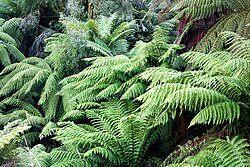| Dicksonia | |
|---|---|
 | |
| Dicksonia antarctica | |
| Scientific classification | |
| Kingdom: | Plantae |
| Clade: | Tracheophytes |
| Division: | Polypodiophyta |
| Class: | Polypodiopsida |
| Order: | Cyatheales |
| Family: | Dicksoniaceae |
| Genus: | Dicksonia L'Hér. |
| Type species | |
| Dicksonia arborescens | |
| Species | |
| Synonyms | |
| |
Dicksonia is a genus of tree ferns in the order Cyatheales. It is regarded as related to Cyathea , but is considered to retain more primitive traits, dating back at least to the Jurassic and Cretaceous periods. The fossil record includes stems, pinnules, and spores.
Contents
The genus contains 20–25 species, distributed from Mexico to Argentina, Brazil, Uruguay and Chile, St. Helena, New Zealand, New Caledonia, Australia, Indonesia, New Guinea, and the Philippines. New Guinea has the greatest diversity, with five species.
Species of Dicksonia found in cultivation include:
- D. antarctica, soft tree fern [1]
- D. fibrosa, woolly tree fern
- D. squarrosa, rough or slender tree fern
The genus was first described by Charles Louis L'Héritier de Brutelle in 1788. The name honors James Dickson, a prominent nurseryman and botanist. [1]









